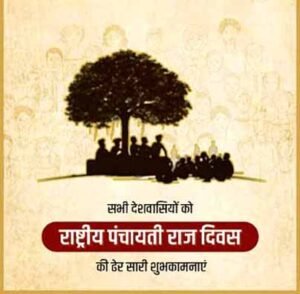
भारतीय पंचायती राज दिवस
हर वर्ष 24 अप्रैल को भारतीय पंचायती राज दिवस को मनाया जाता है. यह दिवस भारतीय संविधान के 73वें संशोधन अधिनियम, 1992 के लागू होने की स्मृति में मनाया जाता है, जिसने भारत में त्रि-स्तरीय पंचायती राज व्यवस्था की नींव रखी. भारत के लोकतांत्रिक इतिहास में पंचायती राज का विशेष महत्व है. यह दिन न केवल इस ऐतिहासिक उपलब्धि का स्मरण कराता है, बल्कि ग्रामीण विकास और स्थानीय स्वशासन को बढ़ावा देने के प्रति हमारी प्रतिबद्धता को भी दोहराता है.
पंचायती राज व्यवस्था का इतिहास कोई नया नहीं है. प्राचीन भारत में भी ग्राम पंचायतों का उल्लेख मिलता है, जो स्थानीय स्तर पर निर्णय लेने और शासन करने में महत्वपूर्ण भूमिका निभाती थीं. समय के साथ, इन पारंपरिक व्यवस्थाओं में बदलाव आया, लेकिन गांवों में स्वशासन की भावना हमेशा विद्यमान रही. स्वतंत्रता के बाद, महात्मा गांधी के ग्राम स्वराज के स्वप्न को साकार करने के उद्देश्य से पंचायती राज व्यवस्था को संवैधानिक दर्जा देने के प्रयास शुरू हुए. बलवंत राय मेहता समिति और अन्य महत्वपूर्ण समितियों की सिफारिशों के बाद, आखिरकार 73वां संविधान संशोधन पारित हुआ, जिसने पंचायतों को संवैधानिक मान्यता और अधिक अधिकार प्रदान किए.
पंचायती राज व्यवस्था ने ग्रामीण भारत में कई महत्वपूर्ण बदलाव लाए हैं. इसने महिलाओं और हाशिए पर रहने वाले समुदायों को राजनीतिक प्रक्रिया में भाग लेने का अवसर प्रदान किया है. पंचायतों के माध्यम से शिक्षा, स्वास्थ्य, स्वच्छता और बुनियादी ढांचे जैसे क्षेत्रों में विकास कार्यों को गति मिली है. स्थानीय स्तर पर योजनाओं के निर्माण और कार्यान्वयन में पंचायतों की भागीदारी से विकास अधिक समावेशी और आवश्यकता-आधारित हुआ है. इसने लोगों को अपनी समस्याओं का समाधान स्वयं ढूंढने और स्थानीय संसाधनों का बेहतर प्रबंधन करने में सक्षम बनाया है.
पंचायती राज व्यवस्था को अभी भी कई चुनौतियों का सामना करना पड़ता है. वित्तीय स्वायत्तता की कमी, कार्यों और निधियों का अपर्याप्त हस्तांतरण, क्षमता निर्माण की आवश्यकता और राजनीतिक इच्छाशक्ति की कमी कुछ ऐसी बाधाएं हैं जो पंचायतों की पूरी क्षमता को साकार करने में बाधक बनती हैं. भ्रष्टाचार और भाई-भतीजावाद जैसी समस्याएं भी कुछ क्षेत्रों में पंचायतों की प्रभावशीलता को कम करती हैं.
पंचायती राज भारतीय लोकतंत्र की एक मजबूत कड़ी है. यह नागरिकों को सशक्त करने का एक प्रमुख माध्यम है. भारतीय पंचायती राज दिवस हमें इस प्रणाली के महत्व को समझने और इसे और भी बेहतर बनाने की दिशा में कार्य करने की प्रेरणा देता है.
========== ========= ===========
Indian Panchayati Raj Day

Indian Panchayati Raj Day is celebrated every year on 24 April. This day is celebrated to commemorate the enactment of the 73rd Amendment Act, 1992 of the Indian Constitution, which laid the foundation of the three-tier Panchayati Raj system in India. Panchayati Raj has a special significance in the democratic history of India. This day not only commemorates this historic achievement, but also reiterates our commitment to promote rural development and local self-governance.
The history of the Panchayati Raj system is not new. Even in ancient India, there is mention of village panchayats, which played an important role in decision making and governance at the local level. Over time, these traditional systems changed, but the spirit of self-governance always existed in the villages. After independence, efforts began to give constitutional status to the Panchayati Raj system with the aim of realizing Mahatma Gandhi’s dream of Gram Swaraj. After the recommendations of the Balwant Rai Mehta Committee and other important committees, finally, the 73rd Constitutional Amendment was finally passed, which provided constitutional recognition and more powers to the Panchayats.
The Panchayati Raj system has brought many important changes in rural India. It has provided women and marginalized communities with an opportunity to participate in the political process. Development work in areas such as education, health, sanitation and infrastructure has gained momentum through panchayats. The participation of panchayats in the formulation and implementation of plans at the local level has made development more inclusive and needs-based. It has enabled people to find solutions to their problems themselves and better manage local resources.
The Panchayati Raj system still faces many challenges. Lack of financial autonomy, inadequate transfer of functions and funds, need for capacity building and lack of political will are some of the obstacles that hinder the realization of the full potential of panchayats. Problems such as corruption and nepotism also reduce the effectiveness of panchayats in some areas.
Panchayati Raj is a strong link of Indian democracy. It is a major means of empowering citizens. Indian Panchayati Raj Day inspires us to understand the importance of this system and work towards making it even better.





